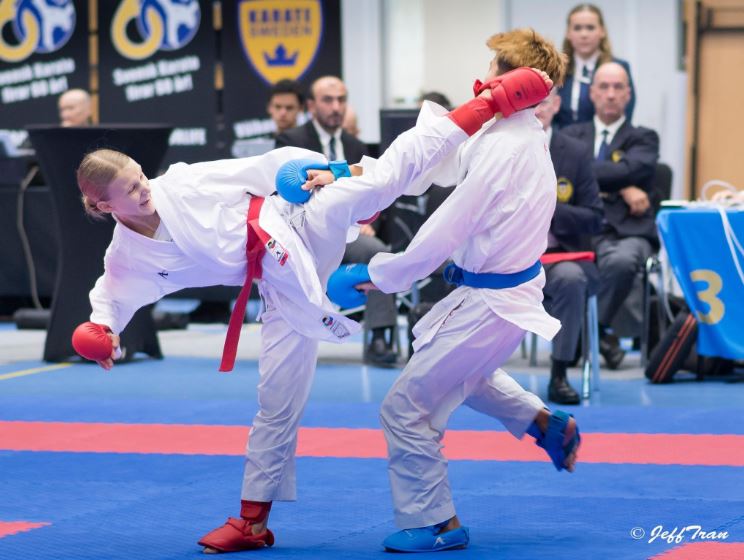Invägning för U14 (12-13år) Kl: 10-12.30 Regler: WKFs regler samt Svenska karateförbundets tillägg för barn & coachregler. Svenska Karateförbundet sponsrar och betalar anmälningsavgiften för alla deltagare som är medlemmar i […]
Kallelse till Årsmöte Medlemmar i Shotokan Klubb Botkyrka kallas till ordinarie årsmöte, måndagen den 28 april 2025 kl 19:00, som kommer avhållas online (Microsoft Teams). Dagordning för mötet är enligt […]



Gichin Funakoshi satte upp en kalligrafibild med 20 visdomar om karate i sin dojo (år 1890), vilket kallas NiJu-kun (=20 regler), som är grunden för den fostran och respekt som sprids genom karate till skillnad från många andra kampkonster.
Reglerna är inte numrerade eller ordnade; var och en börjar med hitotsu som betyder ”ett” eller ”först” för att visa att varje regel har samma betydelsenivå som de andra.
DETALJERAD FÖRKLARING (Engelska)
Rei means courtesy or respect and is represented in karate by bowing.
We bow many times at each karate lesson: at the beginning and at the end of each karate lesson, when receiving personal instructions, when partnering up, when using training equipment, and before and after a sparring session with your partner.
We do this to show respect to our instructors, partners, training equipment, and our place of training.
And this respectful attitude should not be confined to the dojo floor. As you train and make karate a part of your life, this respectful manner should become part of your character.
Life is short and the world is small. You will surely brighten someone’s day up and yours too with your courtesy and respect.
It takes restrain to show respect to someone who doesn’t deserve it, but if you are disrespectful to such a person, you stoop down to their level, and that’s useless.
You might meet someone who you don’t think deserves your respect, but if you are being disrespectful to that person, you’ll stoop down to their level.
The arrogant, the totally selfish, the foul-mouth, the homeless and the alcoholic may not have had the kind of upbringing as you had. Show empathy and treat them with respect as you would with more fortunate people.
Karate is the art of self-defense, first and foremost. We should only use what we learn in karate to defend ourselves and not to provoke conflicts and seek violent encounters.
While you shouldn’t use your karate skills to cause conflicts, if conflicts arise, you should use what you know to the best of your ability to defend, protect and support what you believe is right.
This would make many immediately think of Sun Tzu’s saying “Know yourself, know your opponent, hundred battles, hundred victories“.
In the context of karate the right interpretation is that you need to understand your strengths and weaknesses and train accordingly. For example, if you are a small person who is not very flexible with short legs, high kicks is unlikely to do a lot of damages. So train with an analytical mind and find out what you are good at and what you are not good at. The next part is to understand your opponent or simply your training partner and use appropriate strategies.
Training in karate involves the development of mind, body, and spirit and Gichin Funakoshi’s view is the development of the mind is far more important than the others.
In karate, most of the time you learn to block, punch and kick and there is not much time where your instructor would stop to talk about developing the mind. But that would come about gradually and subtly through years of training. You develop a strong mind, resilience, confidence, and a sense of justice by turning up to train no matter what, pushing through and mastering a difficult technique or a kata, having an open mind and continually seeking to better yourself, being there and helping your training partner and supporting your karate family.
The mind needs to be free of judgment, your own knowledge, worries, plans, and anticipations so that you can be readily open to new ideas, instructions, situations to learn, adapt and deal with them accordingly.
If you are careless in training, problems will ensue. Every single karate technique when mastered can be deadly and if you are not careful, you can easily cause serious injury to yourself and your training partner.
This will come unconsciously to you as you travel along your karate journey. If you put the effort into your training and try to learn as much as you can from the art, you will find that karate influences you in and out of the dojo. You will be more disciplined, more confident, and more respectful and act with integrity.
People learn karate for different reasons, for physical fitness, for self-defense, or simply for being part of a community. But for those who love karate and the many things it has to offer, training in karate is a lifelong pursuit.
There is so much to learn from karate and you will be only scratching the surface even if you spend your whole life studying the art.
You can apply many things that you learn in karate to different aspects of your life. For example, being respectful to people you meet in daily life, having an open mind and listening to your partner when you have an argument or applying what you learn in sparring strategies to solving problems at home and at work
This one is obvious. If you want to continually improve your karate, you need to practice it regularly, there is no other way around.
Both physical and mental fitness can’t be stored. To retain it, you need to continually work on it and challenge yourself.
If you are in a tournament match, you may not know what your opponent is like. He or she could be far better than you technically or could be a definite underdog. If you have the mindset that you must win, you will put pressure on yourself, become tense, and are less likely to be ready to react to the fight as best as you can.
You shouldn’t think about losing either before a fight. Thinking that you’d lose means you’ve already surrendered to your opponent, your spirit is down, you are unlikely to actively defend yourself or deploy techniques and strategies to overcome your opponent.
Instead, don’t think about losing and winning and fight to the best of your ability. If you lose against a better opponent, have no regret. If you win against a poor opponent, it’s fair.
You need to remain flexible and adapt to the individual opponents.
A more clear translation is “The outcome of a battle depends on how one handles emptiness and fullness (weakness and strength)” which doesn’t need interpretation.
As karate is the art of empty-hand fighting, you need to use your whole body as a weapon, not just arms and legs. And they all can be deadly weapons at that.
Gichin Funakoshi lived in a different time and era but this still can apply today.
We face problems within ourselves and within our own homes.
As we venture further and further away, we face more problems and have more complex issues to deal with. We need to be aware of this fact and aim to maintain a zanshin mindset (a state of relaxed alertness).
And karate teaches us not to invite problems, not to incite conflicts but we should always be ready when problems or enemies come our way.
There are many stances in karate (zenkutsu dachi, kiba dachi etc).
They are created to teach people katas because it is easier for instructors to refer to posture names one assumes when perform varying techniques in these katas rather than having to repeatedly describe the specifics of these positions.
These stances are only moment-in-time postures because in an actual fight, you would be moving fluidly and there would be no static stances.
By practicing katas over and over again, these stances will eventually become natural positions.
The first and second statements of this precept seem contradictory to me.
My understanding is that kata is the essence of karate. By performing karate katas over and over again while visualizing fighting an actual opponent, you will develop unconscious reflexes and be able to use them in real fights naturally and effectively. Your kata practice will be reflected in your actual fighting techniques. Accordingly, kata and real fights should be closely connected, otherwise, what is the point of practicing katas.
Do the kata correctly, yes definitely, but experienced karatekas should be able to apply what they learn in kata in real fights.
This is as true in karate as in any other martial arts. One needs to learn to use a combination of soft and hard power, slow and fast techniques, and the extension and contraction of the muscles.
Another translation is “Be constantly mindful, diligent, and resourceful, in your pursuit of the Way” which has quite a substantial difference in meaning.
We are all different with different strengths and weaknesses and different circumstances. I think we should look deep into ourselves, find the best way to live the one and the only life we have and figure out our own karate journey. For some, their karate journey could be linear, for others it could be winding and bumpy, but, like other aspects of our lives, if we remain persistent, diligent and creative, we will succeed.
Chatta med oss på Whatsapp
Hej! Tävlingsgruppens träningen kommer att börja 30 minuter senare och pågå mellan kl. 18:30 och kl. 20:00, tisdagar varannan vecka, fram till terminens slut. ... Visa MerVisa Mindre
0 CommentsKommentera
Nu är dags att anmäla sig till Elit Karate Cup 2025 i Lidingö. Tryck på länken för mer info och anmälan (senast 21/4) för våra medlemmar mellan 7-13 år gamla.
... Visa MerVisa MindreTävling 26/4: Elit Karate Cup 2025 - Shotokan Karate Klubb Botkyrka
karatebotkyrka.se
Lördagen den 26/4 kommer vi att delta på en tävling i både kata och kumite i Lidingö. Vi kommer därför inte ha någon träning den dagen. Tryck här för att […]0 CommentsKommentera
Missa inte Årsmötet, måndagen den 28/4 kl. 19:00!
karatebotkyrka.se/event/arsmote-2025/ ... Visa MerVisa Mindre0 CommentsKommentera